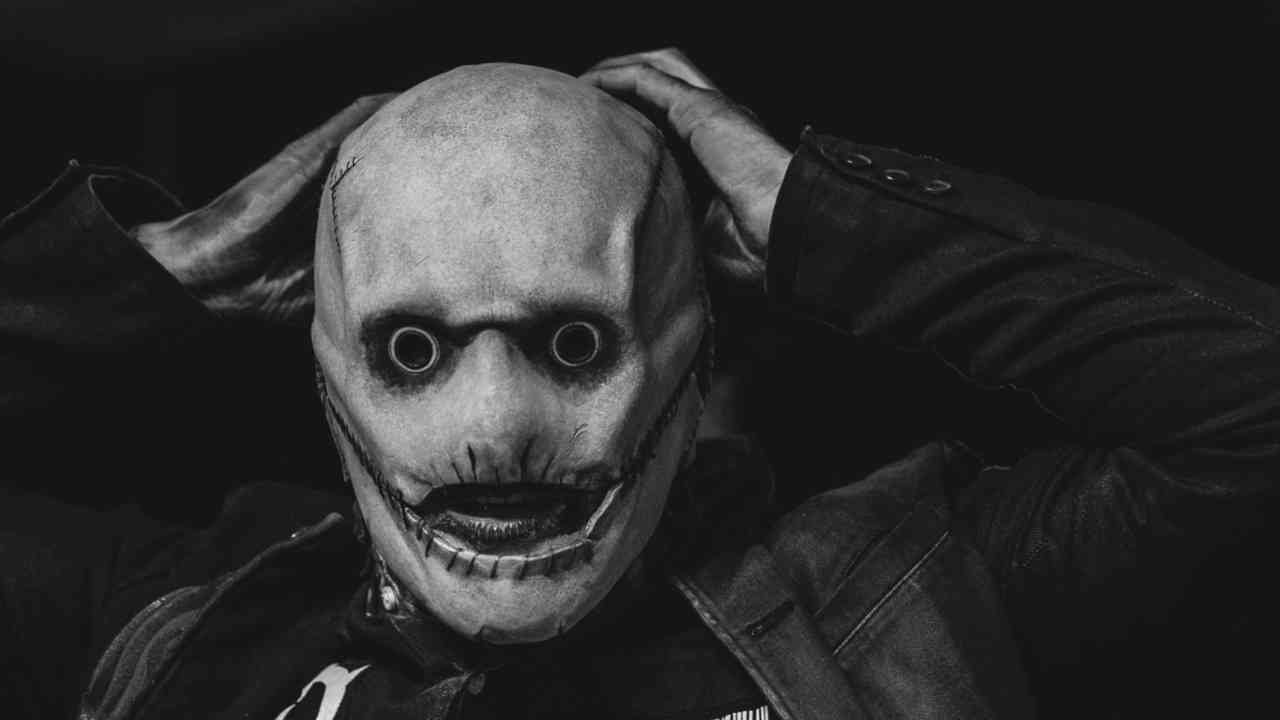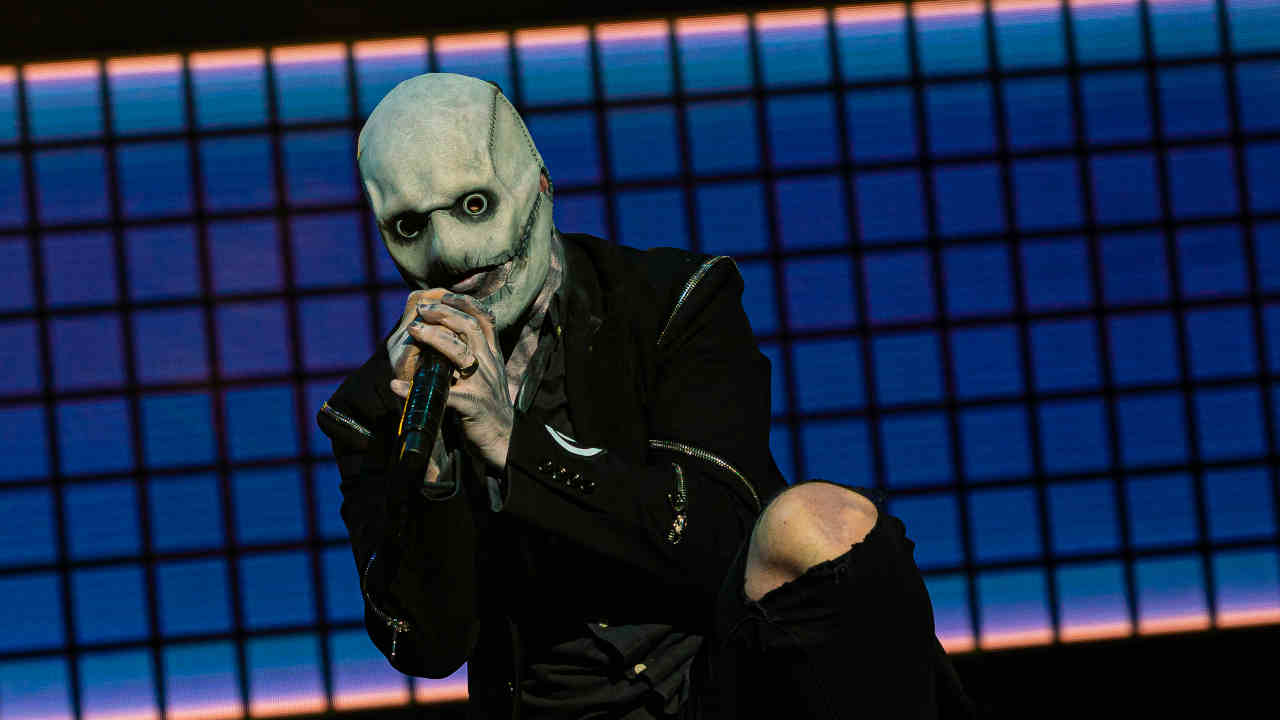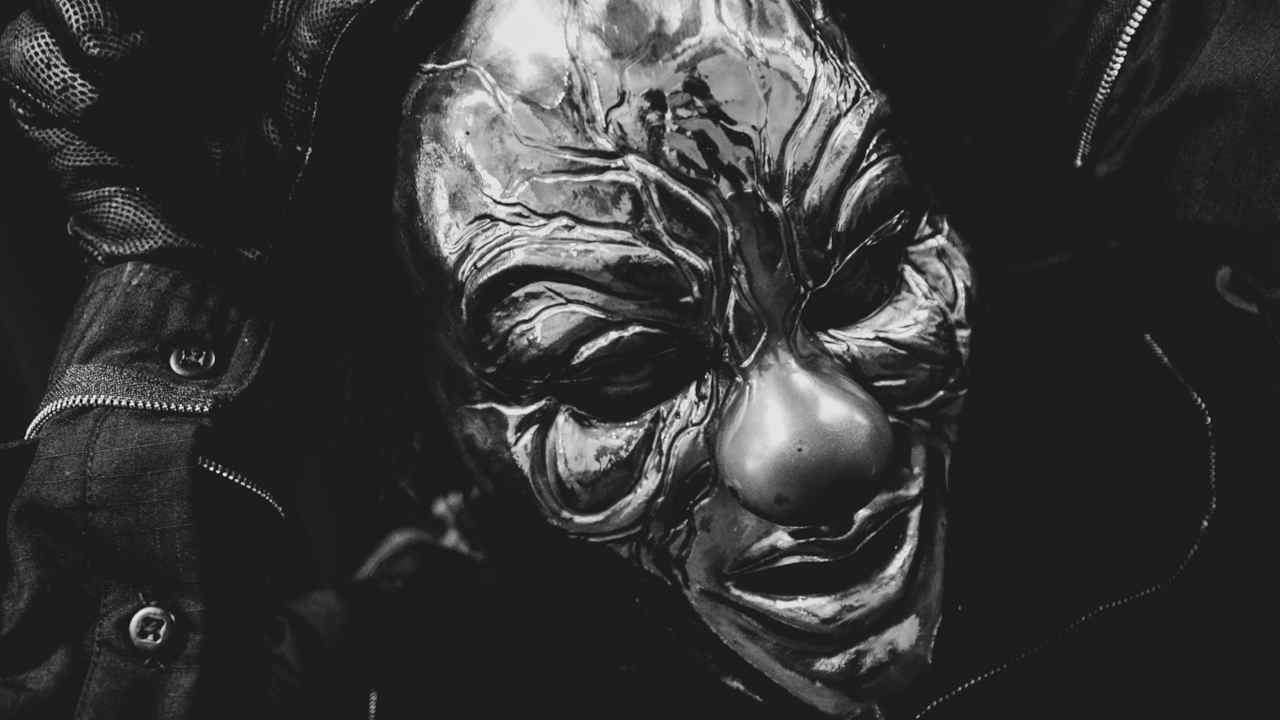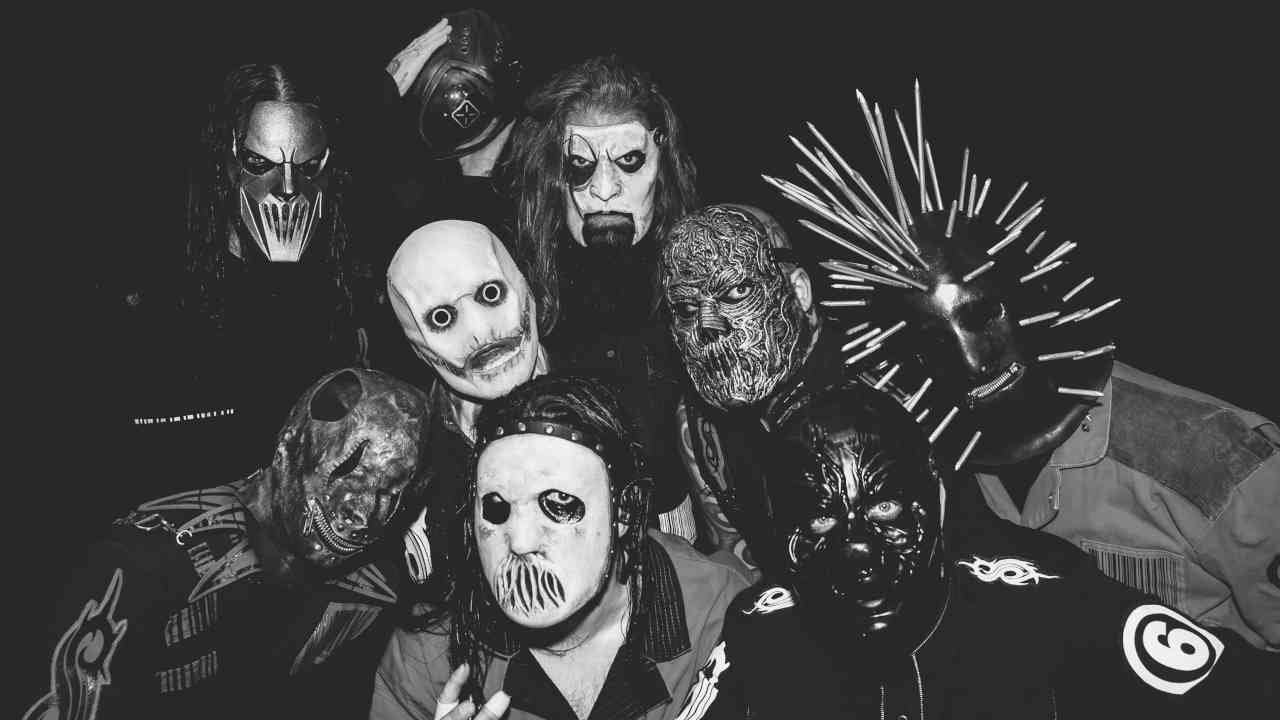There is a moment of buffering. Or perhaps, given that we’re waiting to connect, via Zoom, with Corey Taylor, that should be a moment of suffering, just because it sounds more… Slipknot.
The screen unfreezes to reveal the singer in what appears to be a prison cell – horrible off-white curtains and walls, and a crappy wooden desk – but is in fact a hotel room. Wearing black jeans and a sleeveless black T-shirt, twiddling a ball point pen, he lets a smile cross his face.
“I had to come to Poland to see someone from my city!” he says, on tour with Slipknot and aware that I’m talking to him from Las Vegas, the place he’s called home for the last 13 years. Not that he’s been missing much, apart from a fortnight of biblical rain, thunderstorms and flash floods that turned the Vegas strip into a river.
“Yeah, we need it!” he nods.
Climate change has seen water levels in Lake Mead, the reservoir that feeds the city, fall by a staggering 26 feet in the last year, revealing everything from sunken boats to human remains. Several bodies have been found, one stuffed into a barrel and dating back to the 70s or 80s.
“They found a fucking fifth one!” exclaims Corey. “That’s just crazy, man! That’s some mob shit! And that’s our drinking water!”
Corey is animated today, grinning, goofing around and bringing all the charm you’d expect from metal’s self-proclaimed ‘Great Big Mouth’. Slipknot have been on the road for almost six months now, taking their Knotfest Roadshow back and forth between the US and Canada before starting this European run. Anyone who’s seen the nine-headed beast will attest that they’re on form, delighting thousands of Maggots every night.
But when we last spoke to Slipknot, in 2019, ahead of their sixth album, We Are Not Your Kind, circumstances weren’t so rosy. Corey was recovering from double knee surgery, percussionist Chris Fehn was out of the band, and Clown had tragically lost his daughter, Gabrielle. The tone of their conversation was defiant, but tense. “One day we will just be gone,” Jim Root told us.
So when we heard their new, seventh record was titled The End, So Far, we couldn’t help but worry. Were we about to hear their swansong?
Luckily, Corey is quick to put our minds at ease. The title, he says, refers to “the third era of Slipknot,” and the end of one chapter of the band: the first was ferocity, the second was discovery, the third was loss, the fourth was rediscovery, and now the fifth…
“…is kinda turning around and facing the future, like, what’s next?” he muses. “Not reintroducing ourselves, but rediscovering why we want to do this. It’s Slipknot, so it’s a fucking challenge, but it’s cool, and I like the fact that the personalities in the band have been willing to branch out now. Some people have mellowed, as much as they’ve stayed the same, and they’ve realised that we can really fucking do something. So, I guess the title is a reflection of the end of predisposition, and the end of being too self-conscious to really have the courage to express ourselves. It’s basically the end of what was, and the beginning of what could be.”

If Corey sounds a little cryptic, it’ll all make sense when you hear the record, because The End, So Far is their most experimental release in years. While lead-off singles The Chapeltown Rag and The Dying Song (Time To Sing) saw Slipknot operating on their default setting of savage, the album sees them “branch out” with the addition of bluesy rhythms, choral voices and skewed solos. It’s Slipknot, Jim, but not as we know it.
“I’ve been telling people that this is the natural companion piece to Vol. 3 [: (The Subliminal Verses)],” explains Corey. “Because on [2004’s] Vol. 3 we were really starting to come into our own, as far as being confident in our writing and being able to risk not just going full bore, running at you with all the intensity, but being able to expand what we do. Because of what was going on with the band internally, we forgot that we were a band who could go and do that. We touched on it, but we never got back to that concerted, ‘Let’s really push the boundaries of what a band like this can do.’ It felt good to kind of get back to this world building.”
As if to drive the point home, Adderall is a far cry from any previous opening track – certainly a million miles from, ‘The whole thing, I think it’s sick!’ on 742617000027 from their 1999 self-titled debut, or even Insert Coin on We Are Not Your Kind. Perhaps ‘ballad’ is the wrong word, but it’s not far off. With its keys and crooning, there are flashes of Radiohead and 70s prog…
“When you listen to Adderall, at first it feels like an intro,” explains Corey, “but then you realise this is a proper track, and it takes you where you need to go to listen to this album.”
“It was the first tune I got sent,” he continues. “Clown told me they’d been working on some stuff on the side, and I opened it up and it was really a bare-bones demo. It didn’t even have drums on it, and the choir wasn’t on it. It was almost melancholy, in a weird way, and that’s kind of where I took the approach. It wasn’t until we got the rest of the band on it that it really started to build, and it became almost like a test; it was like, ‘If you can get through this one with an open mind, then maybe we’ll see how you feel about the rest of the album.’ It’s Clown at his very Clownest!”
If We Are Not Your Kind grappled with the maelstrom of uncomfortable emotions arising from Corey’s divorce, as well as being a middle finger to keyboard warriors questioning Slipknot’s longevity, The End, So Far feels less agitated and more self assured. With their line-up solidified, all identities known, and even ‘new’ members now on multiple iterations of their mask, the entire band were involved in the writing process.
“It’s kinda coming from everybody,” Corey tells us. “Clown has really stepped up and he’s been making his musical presence felt even more. Obviously, Jim comes in with great shit. And [bassist] V Man has really stepped into his own and brought in some really cool stuff. [Percussionist/backing vocalist Michael] Pfaff is almost dumbing it down from what he can do, because he’s classically trained and he can play almost every instrument, so he knows theory and all this shit, and yet he happily pulls on his tortilla skin and runs out there. He’s just happy to be here, and he helps with a lot of texture. It’s taken us to this really cool realm, and the great thing about Slipknot is it’s always a reflection of the people who are in it, which is one of the reasons that the sound has developed over the years and it still feels like an ensemble band.”
Corey says he hasn’t written much music for Slipknot in a while, because he hasn’t needed to, but all the lyrics are his own. Given he’s been in good spirits recently, happily married to Alicia Dove of the Cherry Bombs dance troupe, mentally at peace, and cheerfully touring his freewheeling solo project, one wonders if he has to step into a darker mindset to write for Slipknot.
“It’s easier than you’d think,” he reveals. “Obviously, I’m in a great spot. Finally, I have balance, which is unheard of for me! But you can dip your toe into it without immersing yourself. It’s like rolling your pants up to get into the pool, without having to swim. You just wanna feel it, but you don’t want the full experience. I wade into it up to my knees and then I’ve had enough and I get out.”
“That being said,” he continues, “this album, instead of reflecting on my own shit, I’m writing from the standpoint of other people, not just myself, and I’m hoping that it’s more relatable. Heirloom is a perfect example of writing about people who have grown up being abused and having that toxicity seep in, and then later on in life, when they’re in the same position, are they gonna pass on that violence or do they cut the cord? That’s something I’ve never really talked about, and I hope it helps people when they look at the options; they don’t have to be the stereotypical victim of abuse. At the end of the day, the choice is yours.”

Powerful lyrics can be immensely helpful, lifesaving even, for those who are struggling with mental health issues or tough times. Maybe it’s simply the knowledge that you’re not alone in those dark places…
“I never write it from that point of view,” says Corey, “but I had that with [the reaction to] Solway Firth, on the last album. The last line is: ‘You want the real smile, I haven’t smiled in years’, and that was at the end of a very long struggle that I’d been through. With this album, I haven’t found it yet, but there’s definitely things that people [I’ve played it to] are gravitating towards.”
While Corey says that the last track on the album, the aptly named Finale, refers to the band’s career thus far, it seems to go deeper. ‘I know it’s a shame but I gotta stay… because I like it here’, he sings, part apologetically, as his bandmates grind away uneasily, perhaps addressing departed friends he’s unwilling to join, suggesting someone turning away from suicide.
“It’s a little bit of that,” agrees Corey. “I haven’t been full-blown suicidal in a very long time, but there was a bit about six years ago when I was very close. It had a lot to do with my life at the time, but it was never a serious option. It was more like when you’re leaning up against the wall, just to feel how cool the wall is, y’know? It was almost that respite where you don’t know what else to do.”
“But Finale is not fatalist,” he insists. “It’s more reflective. It’s not all destructive, and it’s almost why the album title is so apt, because it’s like, ‘Where are we gonna go next as a band?’ It’s letting go of all the things I’ve been carrying with me for years, or being able to let some of them go. You can’t carry those bricks forever; you can either be a survivor or someone who’s living. A survivor is someone who wakes up and clings to the fact that they wake up every day; someone who is living wakes up, realises that they survived and enjoys life for what it is. The difference between those two mindsets is very stark, and that’s where Finale comes in. After everything that’s happened, I’m still able to face the future with a sort of glee.”
A couple of months ago, Slipknot played Corey’s adopted hometown, selling out the 16,000-capacity MGM Grand Garden Arena. It was a spectacular sight, not least when Corey asked how many people were seeing the band for the first time, and a good three-quarters of the audience – some no older than eight – raised their hands. In a career spanning more than two decades, some of the Maggots have evolved into flies, bringing larvae of their own, and it’s clear that Slipknot are not done winning over new fans.
“Yeah, it’s damn-near third generation!” Corey grins. “It’s something that I say at every show, and I’m surprised every fucking time, because, with the exception of some countries over here in Europe, the percentage is always in favour of people who’ve never seen us. Twenty-three years we’ve been doing this, and it’s not like we’ve been hiding. But at the same time, we only tour every four years when we do an album and do a cycle, and then I go back to whatever project I’m working on. We miss certain pockets, but I think a lot of it comes down to the fact that we’re just bigger than we’ve ever been.”
Corey compares it to when Metallica put out The Black Album and crossed a threshold into mega-stardom. Not, he makes it clear, that he’s comparing Slipknot to Metallica, but certainly he’s aware that Slipknot, against all odds, are a mainstream band, a household name – and have been for some time. This does, however, raise a question about the current state of metal. Where are the contenders trying to steal their crown?
“There’s definitely contenders out there,” argues Corey. “There’s a lot of hungry bands, but maybe they haven’t found their legging yet. There’s creative bands like City Morgue and Ho99o9 that maybe haven’t coalesced around the one album yet. Then you have really heavy bands like Vein.fm and Bleed From Within that maybe haven’t spread their wings yet. There’s pockets of bands that are really, really good…”
But no one doing so with their debut album, right out of the gate, blowing away the opposition.
“Well, we took everything and said, ‘Fuck it’ and just did it,” grins Corey. “Maybe that’s what’s missing now. The creativity’s there, man. Even my boy’s band, Vended [also featuring Clown’s son, Simon, on drums], they have a fire that I’ve not seen in a long time. They’re visceral, they’re in your face, and they fucking love what they do! I’m so proud of him, and I love watching him.”
While The End, So Far is likely to be another No.1 hit across charts worldwide, and isn’t short on blistering moments, there will doubtless be those who insist that some songs would be more suited to Stone Sour… “Go ahead and show me where anybody in this band is in Stone Sour!” Corey shrugs.
To be fair, we could name someone who was in Stone Sour: guitarist Jim Root, who was unceremoniously fired from the band in 2014 and yet continued as a member of Slipknot, which, one imagines, made things rather uncomfortable. Healing took time, says Corey, but the pair are pals again, with a renewed drive for working together.
“He and I are very different people, and we were both going through our own shit in life,” explains Corey. “We reconnected, and we’re actually talking about doing some stuff on the side, outside of Slipknot or Stone Sour. It’s cool to find your friend again and realise that you can find your way back to people that you cared about. Honestly, I can’t sit here and say that I wasn’t responsible for some of the bad feelings. That can only come with self-reflection, and the fact that the things that were going on in my life rippled and affected other people. Once you own up to that, you can start to mend bridges by showing people that you are truly sorry.”
Given the deaths of bassist Paul Gray in 2010 and former drummer Joey Jordison in 2021, there are obviously people with whom those connections are lost, although Corey says that he thinks about them often, not least when writing.
“They’re constantly in my mind,” he relates. “Whether it’s listening to the music we did or being in cities that we were in together, they’re always there. When I write, there’s definitely moments when I wonder how they would have played certain parts. But that just means they never truly go away. Their spirit is always there, and the good times are always there. The bad times, too, but you have to go out of your way to go there. The good times are instantaneous.”

With that in mind, maybe it’s understandable that Corey supports the so-called Pantera reunion, first and foremost because late guitarist Dimebag and drummer Vinnie Paul are being replaced by dear friends Zakk Wylde and Charlie Benante.
“There’s no replacing those guys, ever!” he states. “So, if anyone wants to look at this as not full-blown members, fair enough, but it’s not like they just replaced them with Tweedledee and Tweedledum. You’re talking about family, and the metal community is a massive family. It’s not gonna sound like old Pantera, and people need to prepare themselves for that, but with us, Jay does not sound like Joey and V Man doesn’t sound like Paul. We continue because we need to and we want to. What we need to be doing, is being supportive of Phil and Rex, because think about how they’re gonna feel the first time they step on a stage without the Abbott brothers to play those songs. I know how it feels! It’s a fucking shock to the system, and if we’re not supportive, then why are you at the fucking concert?”
There were talks in Slipknot about whether to continue or not after Paul died, and again when they parted ways with Joey.
“The answer was yes,” says Corey, “because we love the music, and I’m hoping it’s the same reason for them. Even if this is just a last hoorah, those brothers get a tribute and a send-off, and their legacy is unchained from a murder and goes back to music. As a fan, that’s the thing I go back to. If we get a last run with the music, then look at it as a gift.”
As Slipknot approach 2023, armed with a clutch of boundary-pushing songs and a growing legion of fans, it seems like this most chaotic of bands are holding steady. The singer says he spends “a good amount of time” with Sid, with Clown, and with Jim once in a while.
“I hang out with people in spurts, and I’d rather do my own thing than hang out with anybody,” admits Corey. “I’ve always been that way. The only person I really, genuinely like hanging out with is my wife. But we’re all so comfortable with each other in this band that we roll right into our natural positions. We could have not seen each other for two years, but we roll into the room and it all falls into place. That’s when you know that you’ve crossed from band to family.”
He speaks with self awareness. Of knowing that Slipknot is a choice and, after all these years, all the ups and the downs, he’s still here for it – and his bandmates had better be too. “We’re all almost 50 now, and it’s at the point where you’re either in it or you’re not,” he says. “There’s no middle of the road! Get your shit together!”
Published in Metal Hammer 366
